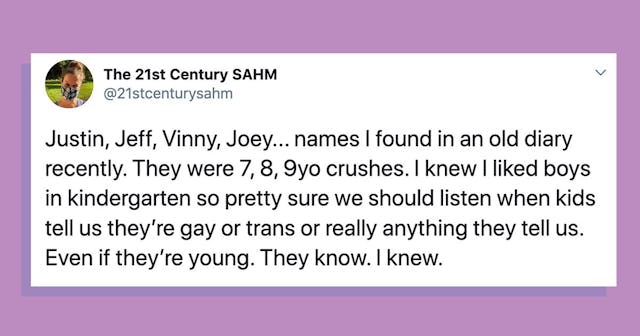Let's Talk About Our First Crush

Let’s do a fun walk down memory lane. Think about your first crush, those first flutters of excitement that were more than friendship. They were waves of affection that maybe you didn’t have words for yet, but you felt them. Seriously, close your eyes for a second and think about the person those feelings were for.
Where were you? Do you remember their name? Magical, right? Those warm fuzzies when the person got close to you or sent attention your way were intoxicating. Or maybe your butterflies made you nervous to the point of losing the ability to speak or make eye contact. Perhaps your first crush made you simultaneously blush and want to vomit. Puppy love is the best. It’s also pretty uncontrollable and can sneak up on us when we least expect it. Now think about, whether told to you directly or overheard, when you knew your feelings of affection were “wrong”. Did you ever believe you weren’t allowed to express your feelings of attraction or love for someone, either in words or actions?
Now let’s add another layer. Let’s talk about gender, which is different than how we fall in love or develop attractions to other people. Think about the first time you were aware of your gender. Have you ever thought about your gender identity or questioned it?
Everyone is assigned male or female at birth based on their biological sex. Sadly, some doctors and parents choose to force visibly intersex babies into boxes by performing non-consensual surgeries to create or remove genitalia or sex organs that don’t “match” the chosen gender. Along with the assumed gender assignment is the assumption that we will all agree with that assigned gender. But what if we don’t? What happens when we don’t accept the gender label or a binary label at all? Who’s wrong and who holds the answers to our own identity?
If your most authentic self has always been accepted, you may never have considered that someone who experienced the same explorations of self has grown up believing or being told that their experiences were wrong, bad, and sinful. This makes a person feel that they are wrong, bad, and full of sin for something they have no control over.
I and others folks who identify somewhere on the LGBTQIA+ spectrum are constantly being challenged and asked or forced to change who we are. We are expected to prove that what we are feeling is valid or correct. We are asked and expected to answer so many questions, only to then be openly doubted; the difference is that we are expressing ourselves in a way that is not perceived as “normal.” But what is more normal than a first crush? Or a person’s sense of self?
My friend Karen (the good version of Karens) at The 21st Century SAHM posted this meme to call out this double standard.
Sexuality and gender are fluid, and everyone’s journey is different, but kids have a pretty good sense of themselves from an early age. Unfortunately, some people think transgender or queer kids equate to sexual deviants, then these same people reveal themselves to be hypocrites when they sexualize kids by assuming their relationships will be heterosexual. With the assumption that a child is straight and cisgender, adults tease kids who have different gender friendships by asking when the wedding will be. Adults are quick to tell a child they will be a “heartbreaker,” dress them in shirts that declare “Stud Like My Daddy,” or warn parents to lock up their daughters lest a boy can’t keep his hands to himself. These misguided heteronormative ideas sexualize kids and hurt LGBTQIA+ youth. Gross and more gross.
According to the Human Rights Campaign LGBTQ Youth Report, 67% percent of youth report that they’ve heard family members make negative comments about LGBTQ people. And when queer kids aren’t at home, they are at school where only 13% of youth report hearing positive messages about being LGBTQ. There is damage in the vocal negativity and in the silence that doesn’t let kids know that the negativity is wrong and that they are far from being bad or someone who should live in shame or fear.
People are interesting if nothing else. Some people wonder why there are so many kids coming out these days. People say they don’t remember there being “so many” gay or transgender people when they were younger; this new wave of queer youth must be a fad. But when a person comes out later in life, perhaps even after a straight marriage or a life lived as a gender that wasn’t right, people judge them for waiting so long. How could you not have known? Look at the damage you have caused.
Many of us did know at an early age, but we hid who we are because we knew it wasn’t safe to come out. And when we did finally let the world know our most authentic self, we may have hidden even longer because of too many years of internalized shame and the need to live up to expectations put on us by society and family.
Be this kind of Karen and listen to your kids. Support them. Just like you probably knew who you liked when you were in elementary school, your kids do too. And as sure as you may have always been about your gender identity, trust your kids when they aren’t sure about theirs. Parents need to put the same ease and open-mindedness into accepting the idea their kid may be queer as they put into assuming their kids are straight and heterosexual.
Age doesn’t equal ignorance. If a child trusts us enough to share their truth, believe them.
This article was originally published on